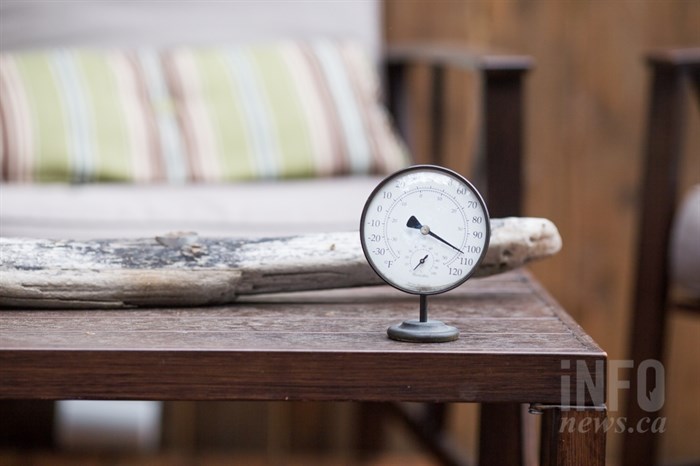
Several cities across B.C. broke high temperatures yesterday, July 6, 2017.
(KIM ANDERSON / iNFOnews.ca)
July 07, 2017 - 6:30 PM
After one of the wettest springs on record, Kamloops and Kelowna are in one of the historically driest summers on record and have already broken heat records.
It's so dry, Environment Canada issued a special weather statement on July 5 warning of the looming heat wave lasting into the weekend. Officials cautioned hot weather would boost the fire danger rating across southern B.C.
Yesterday daily high temperature records were smashed in Kamloops, Kelowna and Penticton and 17 other cities in the province.
In a short amount of time, there's been a dramatic shift from relentless floods to scorching heat.
In the Okanagan, Kelowna had the fourth wettest spring on record this year, with 121.7 mm of rain between March 1 and May 31, which amounts to 35 mm more than normal for the three months. Since then the rain has disappeared in a big way, Environment Canada meteorologist Cindy Yu says.
“Kelowna also had the third driest June on record with only 7.4 mm of precipitation,” she says. “The average is 45.9 mm.”
In Kamloops the drastic difference between spring and summer is just as pronounced, with the ninth wettest spring in the books followed by the third driest June in over 125 years.
“For spring we had 77.1 mm of rain. The average is 54.2 mm,” Yu says. “There was some precipitation in the first bit of June in Kamloops but only 3.4 mm over the month. The average should be around 37.4 mm.”
Things are getting dry in Kamloops. It's been 20 days since Kamloops recorded any precipitation, and that was a meagre 0.8 mm on June 16.
Typically the Okanagan and Thompson regions see rain at some point in June when seasons transition from spring to summer.
“From what we observed on average we usually get a couple rounds of rain or showers in June, but we didn’t really see that this year,” Yu says.
Vernon had its second wettest spring, with over 160 mm of rain, compared to an average of 95.5 mm.
Yu says statistics in Penticton couldn’t be compared to historical due to issues recording statistics, but the South Okanagan town also recorded more than 18 mm of rain over June.
So far in July no precipitation has been recorded in Kamloops, Kelowna, Vernon or Penticton and temperature highs have sat in the mid 20s to mid 30s. There is no rain on the horizon in the seven day forecast from Environment Canada.
The hot, dry weather is starting to affect outdoor recreation across the region.
The top of Knox Mountain Park Drive in Kelowna closed early this week, on July 5, because of the forecast and extreme fire hazard that comes along with it. The closure is one of the earliest ever.
A B.C. Wildfire campfire ban went into effect today, July 7, in the Kamloops Fire Centre following some municipalities' moves to ban them earlier.
To contact a reporter for this story, email Brendan Kergin or call 250-819-6089 or email the editor. You can also submit photos, videos or news tips to the newsroom and be entered to win a monthly prize draw.
We welcome your comments and opinions on our stories but play nice. We won't censor or delete comments unless they contain off-topic statements or links, unnecessary vulgarity, false facts, spam or obviously fake profiles. If you have any concerns about what you see in comments, email the editor in the link above.
News from © iNFOnews, 2017